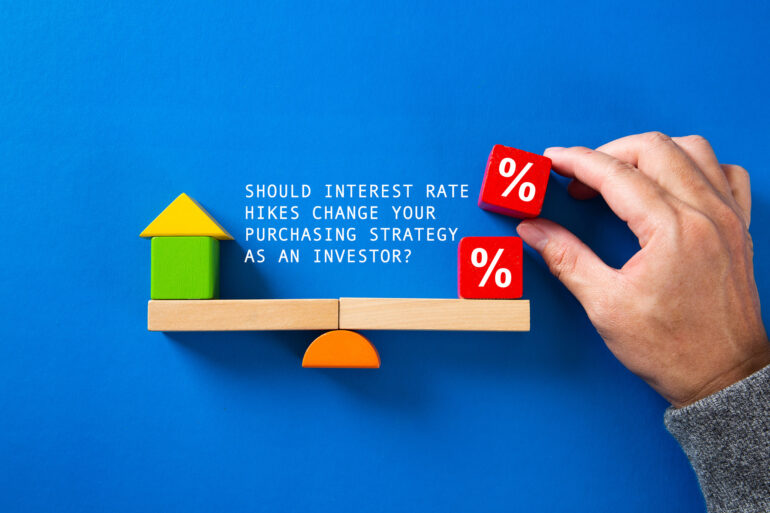Should Interest Rate Hikes Change Your Purchasing Strategy as An Investor?
The Federal Reserve has raised interest rates three times in an effort to fight inflation. Interest rates affect supply and demand dynamics across the economy. Navigating through raising interest rates and sky-high inflation isn’t an easy task for any investors. Some real estate investors are changing their investment strategies, while others are not letting the interest rate hikes bother them. Understanding how interest rates can affect the housing market and possible scenarios will help you make the best decision for your investment strategy.
How Higher Interest Rates Affect Real Estate
Multiple interest rate hikes have made their way into the economy, and the Fed seems committed to doing everything it takes to tame inflation. Higher interest rates translate into higher mortgage costs. A home buyer who uses a 20% down payment to purchase a $500,000 home at a 5% interest rate will pay $2,147 per month on the mortgage, assuming the loan has a 30-year term. The same mortgage rises to $2,398 if the interest rate increases to 6%.
The higher mortgage payments have already caused a stir in the market. According to the Mortgage Bankers Association, mortgage demand is at a 22-year low. Higher monthly mortgage payments make home ownership more difficult. A 3.1% year-over-year decline in real wages and rampant inflation have increased the financial burden on consumers.
Some people still need to sell real estate during this economic cycle. Selling a home can reduce monthly costs as some people opt to downsize. During cycles of rising interest rates, home prices tend to decrease since fewer people want to take out mortgages.
People Still Need a Place to Live
Real estate is a valuable asset because it always has usefulness. While companies can come and go, people always need a place to live. Knowing tenants will stick around since they can’t obtain a mortgage, some tenants are raising their prices. Landlords also feel encouraged to play catch up after the pandemic prevented some of them from collecting rent. Landlords also have raised their rents to counter more expensive services and materials. This theory isn’t true across the United States. The rent in some locations has decreased by over 10%.
The cost of entry may be steeper for new investors, but real estate investors with property portfolios have more security with monthly rent payments. Most tenants will continue living in your rentals and make payments since mortgages are too expensive. If you only care about generating more proceeds from your cash flow producing assets, you are in a good position. A good buy & hold real estate investor keeps the price-to-rent ratio in working in their favor. Real estate prices tend to fall during interest rate hikes, but lower prices only affect you if you sell the property or want to borrow against your property’s equity. Investors with a buy and hold approach won’t feel the impact of reduced housing prices. Some investors may see the weakening real estate market as a buying opportunity.
Should You Make a Higher Down Payment?
Most real estate investors would never consider making an all-cash offer on a home. Tying your available capital into one asset limits your ability to expand. You could buy multiple properties with the same money. Inching the down payment to 25% can counter rising mortgage costs.
In our previous example, a 6% interest on a 20% down payment resulted in a $2,398 monthly mortgage payment. Increasing the down payment to 25% lowers the monthly mortgage payment to $2,248 per month. Increasing the down payment would require an additional $25,000 and still put you below $2,147 per month, the mortgage payment for a 5% interest rate. You would have to put roughly 28% down to have the same monthly mortgage payment with the inflated rate.
Making a higher down payment will reduce your monthly costs, but is it the right decision? Real estate investors should assess potential cash flow before making that decision. Rental property investors must always consider cash flow before acquiring a property. Putting more money down may turn negative cash flow into positive cash flow, but that’s not the case for every property. Some buyers can purchase a home with a 20% down payment or lower and still achieve positive cash flow.
Panicking Is the Worst Approach
Real estate has been a reliable asset for decades. Investors have navigated economic cycles with far higher interest rates than we see in the current market. Although the 1980s featured double-digit interest rates on mortgages, investors found ways to generate profits on their rentals and build their portfolios.
If the Fed continues raising interest rates, monthly mortgage payments for new buyers and variable rate holders will only get more expensive. Housing prices should decline, but if you continue generating positive cash flow, you can hold onto your property and weather the turbulence. Some investors are stockpiling cash to capitalize on potentially lower prices in the future.
It’s easy to focus on current economic headwinds and ignore the fundamentals. Real estate portfolios rely on positive cash flow. Assets in desirable locations that generate a profit will always be optimal for most portfolios. Investors can select from many properties. You should forgo a property if you do not feel confident about the property’s ability to generate cash flow.
Investors should also consider long-term real estate trends. Real estate’s limited supply has allowed the asset to act as an inflation hedge and historically appreciate over time. Real estate investors can periodically increase rent prices while monthly mortgage payments remain the same. This profitability gap can expand in your favor in a few years as landlords continue raising prices to combat inflation.
Paying attention to interest rates gives you an idea of where the market can head in the future. You can make some tweaks to your strategy as interest rates affect supply and demand, two critical components of any real estate market. Adjusting your strategy as you get older also makes sense. Some people accumulate several properties and hope to sell them at retirement. Investors approaching retirement may want a more defensive approach that relies on cash flow instead of reinvestments, but that is a personal decision based on your financial outlook and goals. However, you should never lose sight of your investment criteria. Some properties will still abide by your investment standards and be available at discounts as mortgage demand continue to decline. Knowing what constitutes a great deal will help you find opportunities and avoid getting overwhelmed by short-term price movements.








